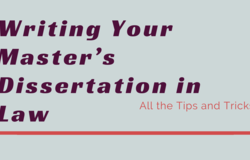Writing Your Dissertation Proposal – Here’s the Only Guide You’ll Need

You have identified your research question/hypothesis, discussed it with your advisor or supervisor, refined it, and have now written it up in scholarly form.
The next step? Writing a dissertation proposal, of course. Having never written such a proposal before, you are naturally a bit anxious. And you certainly want it approved the first time you submit it. Here are tips and strategies that should do just that.
Before You Begin – What is a Dissertation Proposal?
If you have made it this far, you probably do not need to ask what is a dissertation proposal. But, just to be certain, let’s clear up any misunderstanding you might have.
Whether for a thesis or a dissertation, your proposal provides your advisor, supervisor, and, in many cases your committee, with a “map” of sorts – an explanation of your project, its significance, and how you plan to proceed to complete it. In general, it should demonstrate that you have given your research question and your project plan careful thought, based on existing research and how you might contribute to that research through your work.
If you are unsure about how to write a dissertation proposal, you will want to do some “internal research” within your academic department.
- Review proposals of your peers that were approved
- Speak with your advisor or supervisor
- Get the guidelines that your department has published. This is your best source because those guidelines will tell you what must be included and the order in which each section of the proposal should occur.
Sections of a Dissertation (or Thesis) Proposal
While the order may vary, all proposals will contain the following sections. What follows here is an explanation of each section and what it must contain.
- Title Page
This is a “no-brainer,” but be certain that you follow your department’s guidelines for the formatting of this page.
- Introduction
This will be the shortest section of your proposal but it is nonetheless critical. Here, you will provide a scholarly statement of your research question, its importance to your field, and how it will build upon current research. In other words, you are going to justify the significance of what you plan to do. You may refer to general outcomes of related research but do so only briefly. This information really belongs in your literature review section.
- The Literature Review
An entire chapter of your dissertation will be devoted to a review of all pertinent literature, that is, research that has gone on before you, the results of that research, and how your own original research will add to this body of work by others.
For your proposal, however, it is not expected that you will have completed a full review of the literature. It is expected, however, that you have conducted some initial study of some of the major pieces of research that direct relate to your proposed project. You should focus on the major theories and conclusions of this preliminary research and show how your own will confirm, call into question, of add something new to this earlier work. If you have discovered any flaws in this earlier research, they should be addressed, and you should explain how you intend to avoid the same.
- The Methodology/Design
This section is often called the “meat” of the proposal, and it is the one that an advisor or committee will most critically review.
In this section, you will describe how you plan to conduct your research. Is it qualitative or quantitative; will you use a random sampling or experimental and control groups; how will you collect your data; what instruments will you use?
As you explain your design and methodology, you will also need to justify your choice of that design as well as the instruments you plan to use.
And once the data is collected, how will it be organized and analyzed? What will statistical analysis procedures you use to demonstrate significance?
Are their potential nuisance factors or other constraints? It is a good idea to be open about these – chances are your committee members will have already identified them and are expecting you to address them. As well, this demonstrates that you have engaged in some careful and critical thinking in regards to your project.
Statement of your goal or purpose should also be included. What do you predict and expect the outcome to be?
If students run into proposal writing difficulty, it is usually in this section. And if you do, remember this: it is not a comment on your intelligence or your skill as a researcher if you need to seek dissertation proposal assistance. You have never produced such a document before, so give yourself some “slack.” If you need dissertation proposal help, by all means get it – don’t agonize and end up with a piece that isn’t approved. This will slow you down, as you find yourself re-writing parts of it to satisfy a committee member or two. If you can get assistance from a professional proposal writing service, you will have a writer with extensive experience in proposals, and the chances for approval are much greater.
Ethical Considerations: One of the things that proposal writers often fail to include in their methodology are statements related to their adherence to ethical principles. This is especially true when research subjects are human. How will their privacy be protected? If the subjects are minors, are there permission forms for parents/guardians? Even for some scientific studies in which subjects are animals, there are ethical treatment concerns that should be addressed.
- A Timeframe
Most advisors and committees will want to see a schedule for completion. Obviously, this is not carved in stone and is subject to change. But you should provide a reasonable timeline based upon your goals and expectations. Most Ph.D. dissertations take anywhere from 12 – 18 months. Use this as a guideline, and be realistic based upn your other responsibilities.
- Conclusion
This is not really required, but it is always a good idea to summarize what motivated you to undertake this research question and how you believe you will contribute to your field of knowledge.
- Edit, Proofread, and Get Some Feedback
Like any piece of academic writing, nothing should ever be submitted without a full editing and proofreading. And it is often a good idea to have someone else do this. You may be too close to it emotionally to see flaws that an objective reviewer may find.
This is the Beginning
Writing a dissertation is a long-term commitment, but you already know that. Once that proposal is in and approved, you will begin at least a year of work that will give you great highs and horrible lows. In the end, however, the “prize” will be worth the effort, stress, and anxiety.
Don’t let your proposal get the best of you. You have an entire research work to produce. And, by all means, if you need help writing a dissertation proposal, get it.









